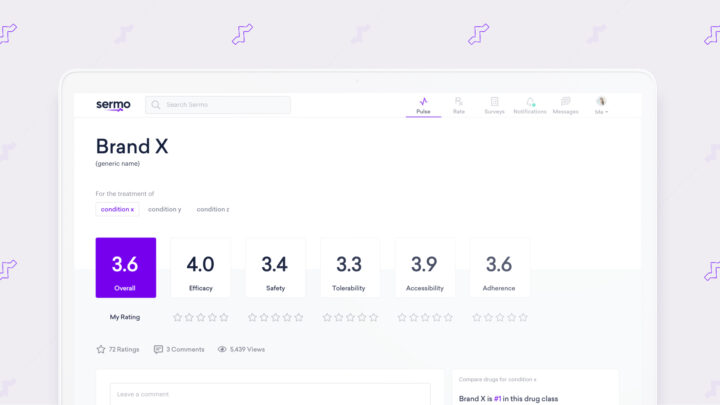
We are in a golden age of medical advancement. Diseases that were deadly and untreatable decades ago—smallpox, polio, tuberculosis—are rare and no longer a certain death sentence. However, effective treatments and therapies are only successful if patients adhere to their physicians’ instructions.
According to a recent Sermo poll of over 1,300 global physicians, 63% report at least 1 in 4 patients struggle to follow treatment guidelines or take medication as prescribed. The reasons given range from the high costs of medications to a lack of awareness of the risks of non-compliance. Misunderstanding treatment directions, too many medications to keep track of, and forgetfulness also bring down patient compliance numbers.
On top of this, 22% of physicians in that same Sermo poll claim they rarely have a complete or accurate account of patients’ medical history when a patient is referred to them. This compounds the issue when patients not following care treatments see doctors unaware of their medical history or the importance of their current care journey.
Miscommunication between caregivers accounts for as much as 80% of serious medical errors. More than just a medical issue—nonadherence to prescribed treatment is thought to cause at least 100,000 preventable deaths—this challenge also costs $100 billion in preventable medical costs per year.
A persistent lack of care coordination leaves our healthcare system facing a poor continuity of care, unnecessary testing, delayed diagnoses, inappropriate treatment, and preventable injuries or death. New technologies need to be adopted to address this challenge. And perhaps we should look outside the medical industry to solve some of these problems.
Blockchain…it’s not just for crypto
At its core, blockchain is a distributed system to record transactions. This database stores information electronically and has far-reaching applications across many industries. Blockchain is already used to facilitate identity management, smart contracts, supply chain analysis, and much more. The full potential of blockchain technology likely remains to be discovered.
Blockchain is big in crypto because it can log every transaction into a digital and public ledger. Imagine if we incorporate this stored ledger technology to facilitate the private and secure transfer of patient medical records or to manage the medicine supply chain. We could better track how patients progress through their care journey and monitor them across systems or organizations.
How blockchain will change the way healthcare is delivered
Blockchain has the potential to make it easier to put the patient in the center of care, while also making healthcare more affordable, accessible, and user-friendly. Having patient data on a blockchain ledger could enable primary care providers and specialists to work together and deliver next-generation synchronized patient care.
Suppose every time a patient completes a step on their care journey—takes their prescribed medication, is administered a vaccine, progresses to the next step of their recovery—we log that action into a secure ledger. This would augment existing EMRs, which are more helpful for billing than care management, and inform physicians to the progress of their patient’s treatment adherence.
Additionally, this record would be unified for any care provider and operate as the single source of truth in our highly disjointed current system. Now doctors could be sure patients are complying with treatments and ensure no one falls through the cracks.
Blockchain applies to current patient adherence and compliance best practice strategies
- Communication: Providers can get immediate feedback on whether their interventions are improving patient health without needing to wait for the next appointment
- Follow the patient even if they switch doctors: A single ledger that records all patient health transactions
- Share education and resources throughout the journey: Flow charts to deliver the right information at the right time in a patient’s care journey
What’s next?
Over the next seven years, blockchain technology is estimated to undergo a 70% compound annual growth rate in healthcare due to growing data breaches in the industry. Blockchain has the potential to disrupt healthcare and put patients back in the center of care with improved coordination and tracking. We all know how hard it is to stay organized in today’s system. Care is still frequently done face-to-face, by fax, over the phone, or even through a courier.
A proper technology-based care coordination model would create an environment that connects patients, family members, care providers, and other permissioned parties in real-time, securely synchronizing all those involved in a patient’s healthcare journey. But this is not just science fiction, we have proof that this approach works.
Kaiser Permanente Northern California demonstrated that, through a combination of simple elements and approaches centered on the electronic health record, providers are able to improve medication adherence rates and care coordination to above 80% via technology.
Next-generation healthcare will be a game changer. Advancements in treatments, technology, and medical science are allowing for longer, happier, healthier lives for our global population. Blockchain is just one cog in this wheel, but one that is already here and available, we just need to turn it on.
Interested in more physician insights? Check back any time and follow us on Facebook, Twitter, and LinkedIn for the latest and greatest in physician insights.
Are you a physician or healthcare practitioner?
Explore the many benefits of joining Sermo’s medical community and sign up for free today.








